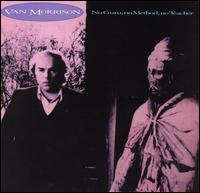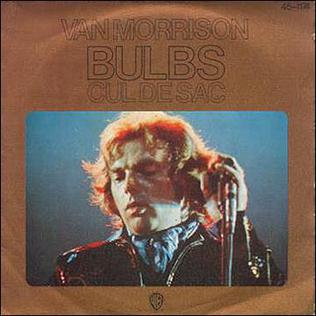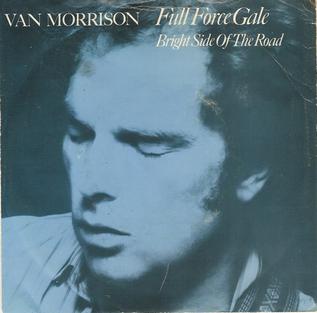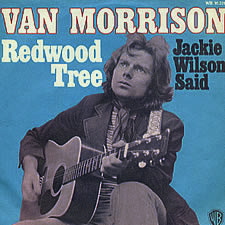
Veedon Fleece is the eighth studio album by Northern Irish singer-songwriter Van Morrison, released in October 1974. Morrison recorded the album shortly after his divorce from wife Janet (Planet) Rigsbee. With his broken marriage in the past, Morrison visited Ireland on holiday for new inspiration, arriving on 20 October 1973. While there he wrote, in fewer than three weeks, the songs included on the album.

A Period of Transition is the ninth studio album by Northern Irish singer-songwriter Van Morrison, released in 1977. It was his first album in two-and-a-half years, largely forgotten or overlooked by most casual fans. At the time of its release it was received with some disappointment by critics and fans: "Most were hoping for a work of primeval vocal aggression that would challenge the emerging élite of Morrison pretenders, whose ranks included Bruce Springsteen, Bob Seger, Phil Lynott, Graham Parker and Elvis Costello." However, the album is still notable for several major compositions, including "Heavy Connection", "Flamingos Fly", "The Eternal Kansas City" and "Cold Wind in August".

No Guru, No Method, No Teacher is the sixteenth studio album by Northern Irish singer-songwriter Van Morrison, released in 1986 on Mercury.

Poetic Champions Compose is the seventeenth studio album by Northern Irish singer-songwriter Van Morrison, released in 1987 on Mercury Records. It received generally positive reviews from critics, most of whom viewed it as adequate mood music.

Irish Heartbeat is the eighteenth studio album by Northern Irish singer-songwriter Van Morrison and is a collaboration with the traditional Irish musical group the Chieftains, released in 1988. It was recorded at Windmill Lane Studios in Dublin, Ireland, and reached number 18 in the UK album charts.

Avalon Sunset is the nineteenth studio album by Northern Irish singer-songwriter Van Morrison. It was released in 1989 by Mercury Records to both commercial and critical success. In 2008, Avalon Sunset was reissued and remastered, featuring an alternative take of "Whenever God Shines His Light", and a version of "When the Saints Go Marching In" with additional lyrics by Morrison.

"Bright Side of the Road" is a song written by Northern Irish singer-songwriter Van Morrison and included on his 1979 album Into the Music. It was also one of the outtakes that made up the 1998 compilation album, The Philosopher's Stone. As a single "Bright Side of the Road" was released in September 1979 and charted at #48 in the Netherlands, #63 in the UK and just outside the Billboard Hot 100 in the USA at #110.

"Warm Love" is a hit song written by Northern Irish singer-songwriter Van Morrison.
"Slim Slow Slider" is the closing track on the 1968 album Astral Weeks by Northern Irish singer-songwriter Van Morrison.

"Queen of the Slipstream" is a romantic ballad written by Northern Irish singer-songwriter Van Morrison and recorded on his 1987 album, Poetic Champions Compose. In 1988 it was released as a single in the U.K., but did not chart.
"Moonshine Whiskey" is a song written by singer-songwriter Van Morrison and is the concluding track of his 1971 album Tupelo Honey.

"Bulbs" is a song written by Northern Irish singer-songwriter Van Morrison. It was the only single to be taken from his 1974 album Veedon Fleece, with a B-side of "Cul de Sac" for the US release and "Who Was That Masked Man" for the UK release.

"Full Force Gale" is a song written by Northern Irish singer-songwriter Van Morrison. It was included on his 1979 album Into the Music.

"Enlightenment" is a single written by Northern Irish singer-songwriter Van Morrison and included on his 1990 album Enlightenment.
"Brand New Day" is a song written by Northern Irish singer-songwriter Van Morrison and featured on his 1970 album Moondance.

"Come Running" is a song written by singer-songwriter Van Morrison and included on his 1970 album Moondance.

"Blue Money" is a song written by Northern Irish singer-songwriter Van Morrison. It was the second of two Top Forty hits from his 1970 album, His Band and the Street Choir, reaching #23 on the US charts. The US single featured "Sweet Thing", from the album Astral Weeks, as the B-side. It was released as a single in the UK in June 1971 with a different B-side, "Call Me Up in Dreamland". The song became Morrison's third best selling single of the 1970s, remaining on the charts for three months.
"These Dreams of You" is a song written by Northern Irish singer-songwriter Van Morrison and featured on his 1970 album Moondance. This song was also included on Morrison's 1974 live album, It's Too Late to Stop Now.

"Redwood Tree" is the sixth song on Northern Irish singer-songwriter Van Morrison's 1972 album, Saint Dominic's Preview, released in July 1972 by Warner Bros.. It was later released in October as the second of three singles from the album and charted at number 98 on the US Billboard Hot 100.

"Call Me Up in Dreamland" is a song that was written by Northern Irish singer-songwriter, Van Morrison and included on his 1970 album, His Band and the Street Choir. Brian Hinton describes the song as "life on the road, with 'radio' as a verb and laughing sax."














